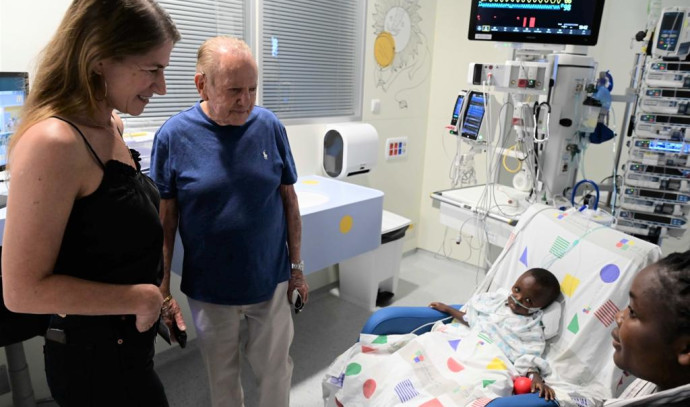Israel has prided itself for many years on being a very child-oriented country – but in fact, its treatment of children in hospitals and clinics is in many cases very inadequate, and planning for the years and decades ahead is abysmal.
The State Comptroller, in his 195-page chapter on the Health Ministry, gives it failing marks for not seeing to it that pediatrics departments around the country have enough beds, advanced equipment and medical manpower, and also for not ensuring that children get the dental care to which they’re entitled.
One would be hard put to find anything positive in the comptroller’s thick chapter on the ministry.
Pediatric wards not growing fast enough to serve growing population
Between 2009 and 2020, the number of children in Israel increased by about 23%, but during this period, the number of budgeted beds in pediatric wards decreased by 21, from 1,089 beds in 2009 to 1,068 in 2020.
The number of children hospitalized in the children’s wards in 2021 was 129,000, some of them more than once, and the cumulative number of days of hospitalization in the wards this year was about 425,000 (not including wards for special care of newborns).
By 2050, the number of hospitalization days in pediatric departments is expected to increase by about 68%, but the ministry has not set long-term basic goals for the hospitalization system – the number of beds per 1,000 people, the desired occupancy in the hospitals and the average length of hospitalization in the wards.
The occupancy of pediatric beds in 11 of the 21 general hospitals, the occupancy rate was higher than the average in the OECD countries. In seven of these, the occupancy was more than 94%. In most of the periphery, the rate was low, but at Beersheba’s Soroka-University Medical Center, the rate was a high 87%.
Children not seeing pediatric specialists
Many sick children are not treated by pediatrics specialists in community clinics who learn to properly diagnose diseases, give appropriate treatment, manage complex disease cases well and can prevent worsening of the disease and unnecessary referral to the emergency room, as well as can reduce re-hospitalizations. The proportion of children aged 0-12 who were treated by a specialist in pediatrics ranges from 36% in Leumit Healthcare Services to 90% in Maccabi Healthcare Services.
The comptroller faulted the ministry for not setting goals for the number of doctors who are “super-specialists” in pediatrics according to the various areas of specialization, and it does not have a long-term plan that takes into account the need for these doctors and provides it with an appropriate response. The lack of super-specialists is also reflected in the long waiting times for them in the community. Left with no choice, parents are sometimes forced to turn to private medicine, and alternatively to hospitals, putting unnecessary burdens are created on the hospitalization system.
The ministry failed even to estimate the number of specialist doctors required in the field of intensive care for children and to set a multi-year target for the number of doctors to be trained in this field. In seven out of 21 hospitals, there is no doctor specializing in emergency medicine or pediatrics on the night shift.
Children waiting longer for common surgeries despite Health Ministry program
Although the Health Ministry runs a program to shorten queues, which costs a total of NIS 2.54 billion and which includes the three common children’s surgeries – tonsillectomy surgery, ear-button surgery and hernia surgery – in 11 out of 17, the waiting time is getting longer, and sometimes, children are hospitalized in departments not suitable for them such as mental treatment or rehabilitation settings due to the lack of space.
As for nurses, the need to update and check the relevance of the standard set by the ministry in 1996 was not re-examined. In 2020, Israel was in the bottom quarter in terms of the number of nurses per 1,000 people among about 40 countries, and there is no standard for paramedical workers in the hospitals, despite the importance of their role. Although home-hospitalization for children has already started around the world, there is no such thing for Israeli children.
Comptroller recommends Health Ministry prepare detailed, multi-year plan
The comptroller recommended that the ministry prepare a multi-year plan detailing the number of beds required in the various wings of the hospitalization system, including the pediatric departments and mental health services, and plan how to shorten the queues for surgeries. It must also reduce the gaps between the periphery and the center of the country.
The second part of the chapter dealt with pediatric dentistry. In 1994, when the State Health Insurance Law was enacted, it was not applied to the field of dentistry, and the health funds were not charged with providing the services to the members of the funds, except for unique populations like cancer patients. As a result, families financed the treatments privately. The expenditure on dentistry here was NIS 5.3 billion in 2010, 7.5% of the total national expenditure on health, and in 2020 the expenditure amounted to 7.7 billion NIS, 6.9% of the total national health expenditure.
From July 2010 to January 2019, dental health services for children up to the age of 18 were gradually included in the basket, and from 2019, dental health services for the elderly aged 75 and up that which include preventive and restorative dental treatments were also included in the basket. This was recently expanded to those aged 72 and up.
In 2021, there were about 3.1 million children and another 480,000 people aged 75 and over who were eligible to receive services under the basket, and the budget for dental treatments for children was NIS 750 million and for the elderly NIS 320 million. However, only about 30% of all children were taken by their parents for dental care by the health funds. the average rate of the children who received care in all the funds was about 30%.
The largest rate of utilization of the entitlement to dental care for children is among Jewish children were members of Maccabi, at 39%, and the smallest rate among the children in the non-Jewish community were in Leumit, at 14%. Audits showed that that the four public health funds failed to meet the waiting times set by the ministry.
The ministry’s follow-up and supervision of the waiting times are inadequate, so they can’t be regarded as complete and reliable information for improving and optimizing the service, the comptroller continued. A fifth of parents were unable to make an appointment for their children with a dentist. It was also found that 42% of the children’s parents are not satisfied with the availability of appointments for doctor’s examinations and dental treatments.
As for treatment for the elderly, the health funds provided only minimal dental care; preventive care was were given to just five percent and restorative treatments were given to just two percent of the elderly who were entitled to it.
The ministry has not systematically carried out complete dental epidemiological surveys on the state of dental disease in the general population or test the usefulness of the reforms to assess the quality of services, the comptroller found.
Two-thirds of dental specialists studied abroad, but in contrast to general medicine for which the ministry established detailed rules, it did not regulate such conditions for recognition regarding dentistry so the country relies to a large extent on doctors trained abroad without having any influence about their training and its suitability for our health system.
The comptroller called on the ministry to correct all the deficiencies regarding dental care for children and the elderly, including the formulation of a plan to meet the target it set for 2030 for the desired rate of specialist dentists and take steps to achieve it.




